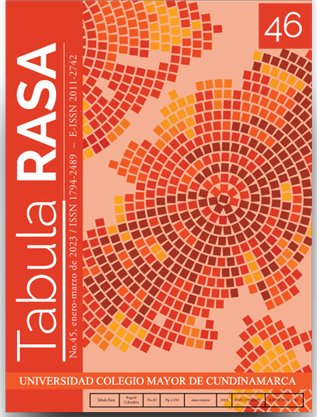Latin American Environmental Research and Practice
Investigación académica y prácticas artísticas ambientales latinoamericanas
Show authors biography
This dossier brings together four essays that show how recent scholarship, art, and design practice are shaping the emergent field of Latin American Environmental Humanities — a rapidly consolidating discipline that cross-fertilises methods and perspectives stemming from the social sciences, arts and humanities, natural sciences, and Indigenous thought, to critically interrogate environmental histories and confront contemporary challenges. Together, these review essays map a critical renewal of cultural studies that is currently unfolding through recent theoretical-analytical publications, ethnographic work, art practice, and site-specific art and design collaborations. We trace routes through a diverse corpus of emerging environmental scholarship, artistic and situated practice research, and public engagement activities, to show how they respond to the urgent challenge “to think in the presence of ongoing facts of destruction”. The books, artworks, and collaborative fieldwork projects reviewed here problematise the culture/nature dichotomy as constitutive of the current ecological and climate crises, rethink the Western metaphysics of ontology and semiotics, and seed sympoetic experiments and alternate ways of knowing that reach across disciplinary divides.
Article visits 286 | PDF visits 67
Downloads
- Andermann, J., Blackmore, L. & Carrillo Morell, D. (2018). Natura: Environmental Aesthetics After Landscape. Zurich: Diaphanes.
- Blackmore, L., & Gómez, L. (2020). Liquid Ecologies in Latin American and Caribbean Art. London: Routledge.
- Bollington, L. & Merchant, P. (2020). Latin American Culture and the Limits of the Human. Gainesville: University of Florida Press.
- Briceño, X. & Coronado, J. (2019). Visiones de los Andes: ensayos críticos sobre el concepto de paisaje y región. Pittsburgh: University of Pittsburgh; La Paz: Plural Editores.
- De la Cadena, M. (2015). Earth Beings: Ecologies of Practice Across Andean Worlds. Durham, NC: Duke University Press.
- DeLoughrey, E. (2019). Allegories of the Anthropocene. Durham, NC: Duke University Press.
- Depetris Chauvin, I. & Urzúa Opazo, M. (2019). Más allá del mapa. Imaginarios del espacio abierto en la cultura latinoamericana contemporánea. Santiago de Chile: Ediciones Universidad Alberto Hurtado.
- Emmett R. & Nye, D. (2017). The Environmental Humanities: A Critical Introduction. Cambridge, MA: The MIT Press.
- Escobar, A. (2018). Designs for the Pluriverse: Radical Interdependence, Autonomy, and the Making of Worlds. Durham, NC: Duke University Press.
- Flores, T. & Stephens, M. A. (2017). Relational Undercurrents: Contemporary Art of the Caribbean Archipelago. Durham, NC: Duke University Press.
- French, J. & Heffes, G. (2021). The Latin American Ecocultural Reader. Evanston, IL: Northwestern University Press.
- Fornoff, C. & Heffes, G. (2021). Pushing Past the Human in Latin American Cinema. Albany: State University of New York Press.
- Gagliano, M., Ryan, J. & Vieira, P. I. (2017). The Language of Plants: Science, Philosophy, Literature. Minneapolis: University of Minnesota Press.
- Gómez-Barris, M. (2017). The Extractive Zone: Social Ecologies and Decolonial Perspectives. Durham, NC: Duke University Press.
- Gudynas, E. (2011). Buen vivir: germinando alternativas al desarrollo. América Latina en movimiento, ALAI, 462, 1-20.
- Hoyos, H. (2019). Things with a History: Transcultural Materialism and the Literatures of Extraction in Contemporary Latin America. New York: Columbia University Press.
- Jørgensen, D. (2022). Isn’t All Environmental Humanities ‘Environmental Humanities in Practice’? Environmental Humanities, 14(1). https://doi.org/10.1215/22011919-9481561
- Krenak, A. (2020). Ideas to Postpone the End of the World. Trad. Anthony Doyle. Toronto: House of Anansi Press.
- Kressner, I., Mutis, A. M. & Pettinaroli, E. (2020). Ecofictions, Ecorealities and Slow Violence in Latin America and the Latinx World. New York: Routledge.
- Lozano, A.M. (2016). Humanos/no humanos: reflexiones sobre el fin de la excepción humana. Bogotá: Fundación Gilberto Alzate Avedaño.
- Marras, S., Cabral de Oliveira, J. Amoroso, M. et al. (2020). Vozes vegetais: Diversidade, resistências e histórias das florestas. São Paulo: Ubu.
- Martínez-Pinzón, F. (2016). Una cultura de invernadero: trópico y civilización en Colombia (1808-1928). Madrid: Iberoamericana; Frankfurt am Main: Vervuert.
- Merlinsky, G. & Serafini, P. (Eds.) (2020). Arte y ecología política. Buenos Aires: Clacso.
- Miller, T. L. (2019). Plant Kin: A Multispecies Ethnography in Indigenous Brazil. Austin, TX: University of Texas Press.
- Moñivas, E. (2020). Water, Women and Action Art in Latin America: Materializing Ecofeminist Epistemologies. En L. Blackmore & L. Gómez (eds.). Liquid Ecologies in Latin American and Caribbean Art (pp. 127-143). London: Routledge.
- Page, J. (2021). Decolonising Science in Latin American Art. London: UCL Press.
- Puig de la Bellacasa, M. (2012). “Nothing Comes Without Its World”: Thinking With Care. The Sociological Review, 60(2), 197-216. https://doi.org/10.1111/j.1467-954X.2012.02070.x
- Rivera Cusicanqui, S. (2015). Sociología de la imagen: miradas ch’ixi desde la historia andina. Buenos Aires: Tinta Limón.
- Rivera Garza, C. (2020). The Restless Dead: Necrowriting and Disappropiation. Nashville, TN: Vanderbilt University Press.
- Rogers, C. (2019). Mourning El Dorado: Literature and Extractivism in the Contemporary American Tropics. Charlottesville: University of Virginia Press.
- Santos, B. (Ed). (2008). Another Knowledge Is Possible: Beyond Northern Epistemologies. New York: Verso Books.
- Santos, B. (2014). Epistemologies of the South: Against Epistemicide. London: Routledge.
- Saramago, V. (2021). Fictional Environments: Mimesis, Deforestation, and Development in Latin America. Evanston, IL: Northwestern University Press.
- Smith, A. M. (2021). Mapping the Amazon: Literary Geography After the Rubber Boom. Liverpool: Liverpool University Press
- Smith, H. & Dean, R. T. (2009). Practice-led Research, Research-led Practice in the Creative Arts. Edinburgh: Edinburgh University.
- Stengers, I. (2013). Introductory Notes: An Ecology of Practices. Cultural Studies Review, 11(1), 183-196.
- Theriault, N. & Kang, S. (2021). Toxic Research. Political Ecologies and the Matter of Damage. Environment and Society: Advances in Research, 12, 5-24. https://doi.org/10.3167/ares.2021.120102
- Uribe, V. (2016). Tarabitas y cabuyas: la representación del puente en el arte en Colombia durante el siglo XIX. Bogotá: Ediciones Uniandes.
- Viveiros de Castro, E. (1998). Cosmological Deixis and Amerindian Perspectivism. The Journal of the Royal Anthropological Institute, 4(3), 469-488.
- Wylie, L. (2020). The Poetics of Plants in Spanish American Literature. Pittsburgh, PA: Pittsburgh University Press.








